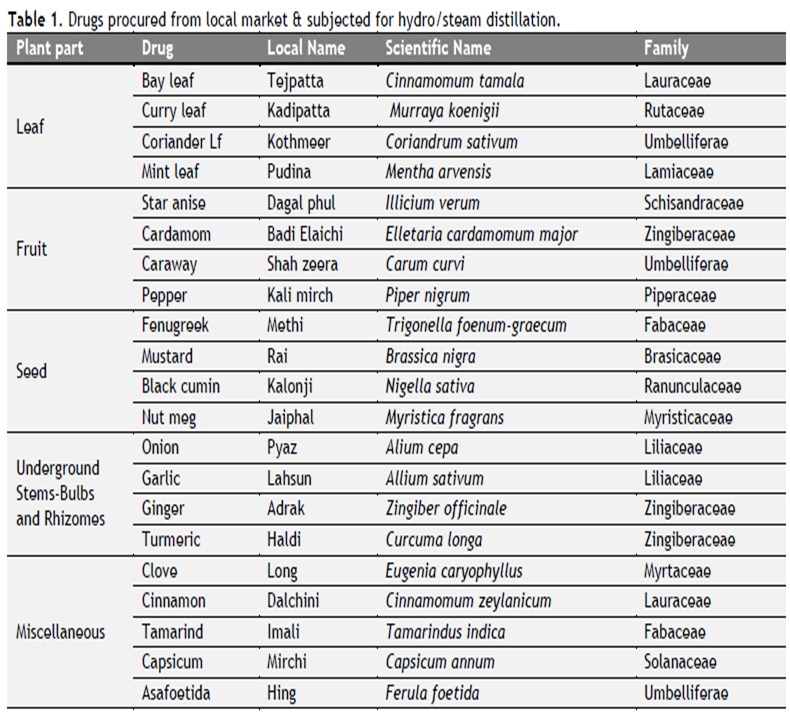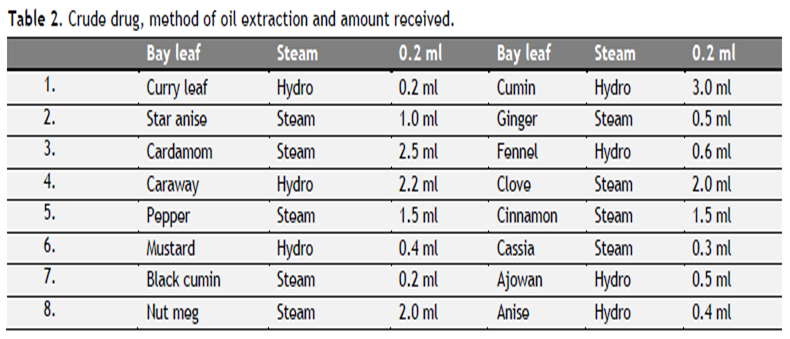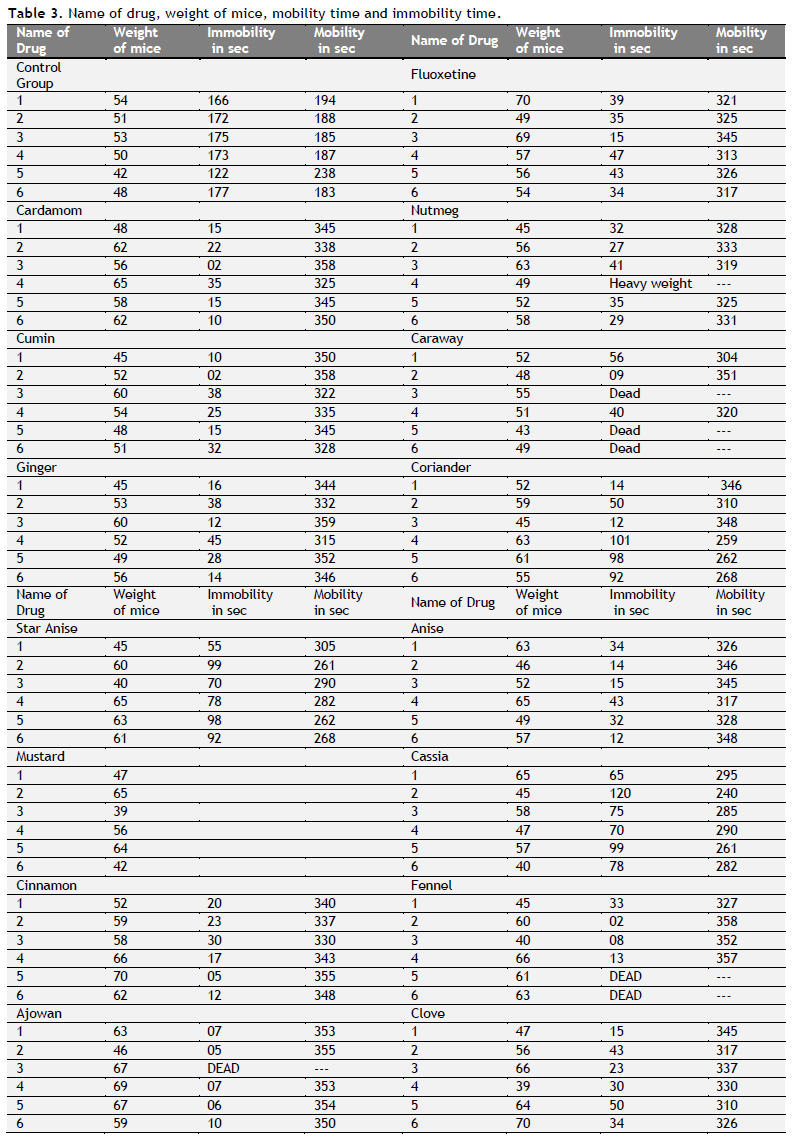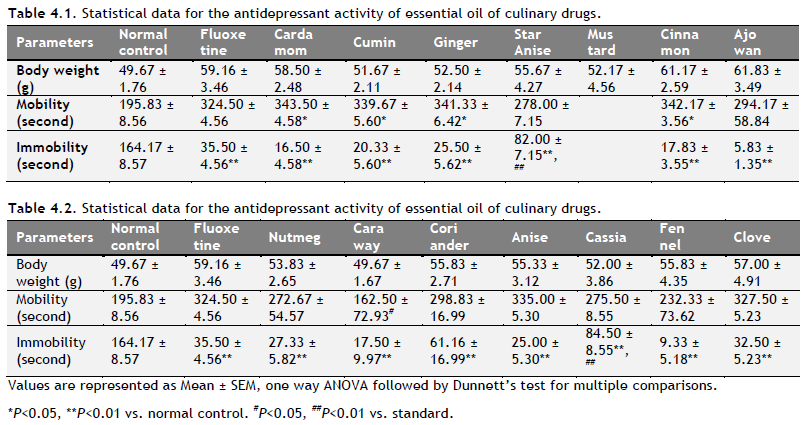Mohib Abdul Jalil Khan *, Imtiyaz Ansari, Amjad Ali Mohammad Iqbal
Oriental College of Pharmacy, Navi Mumbai, Maharashtra- 400705, India.
ORIGINAL RESEARCH ARTICLE
Volume 3, Issue 3, Page 142-146, September-December 2015.
Article history
Received: 10 December 2015
Revised: 18 December 2015
Accepted: 26 December 2015
Early view: 30 December 2015
*Author for correspondence
E-mail: [email protected]
Background: At worldwide level, volatile oils are being used in perfumery and as stimulant. It has been indicated that volatile oil of Piper laetispicum shows antidepressant activity. However, from literature survey, it was found that studies showing antidepressant effect of volatile oil of Piper nigrum and other culinary drugs used in the kitchen is lacking. Therefore, the present study was undertaken to examine whether the essential oil from culinary drugs have antidepressant-like activity in mice.
Material and Methods: Culinary drugs used in kitchen, Leaves-Bay, Curry, Coriander and Mint; Fruits-Star anise, Pepper, Cardamom, Caraway and Fennel; Seeds-Fenugreek, Mustard, Nutmeg and Black Cumin; Underground stem-Onion, Garlic, Ginger and Turmeric; Miscellaneous-Clove, Cinnamon, Capsicum, Tamarind and Asafoetida. Isolation is done either by hydro distillation or by steam distillation method. At the same time an attempt is made to evaluate antidepressant potential comparatively for the volatile oils of culinary herbs, using forced swimming method, on albino mice with Fluoxetine as standard antidepressant drug.
Results: All volatile oils, used in this study, produced a significant reduction in immobility along with an increase in climbing behavior which is similar to those which have been observed with fluoxetine. Essential oil caused a dose -dependent reduction in immobility and an increase in climbing at all studied doses, compared to control group.
Conclusion: The results of this study suggests that the Anise oil, Ginger Oil and Cumin oil, Cardamom oil, Cinnamon oil, Ajowan oil and Fennel oil possess an antidepressant -like activity similar to Fluoxetine which may have a potential clinical value for treatment of depression.
Keywords: Culinary herbs, Distillation, Fluoxetine, Antidepressant activity worthwhile to see antidepressant activity of essential oils obtained from culinary drugs using Forced Swimming method (Khan, 2015).
INTRODUCTION
An essential oil is a concentrated hydrophobic liquid containing volatile aroma compounds from plants. Essential oils are also known as volatile oils, ethereal oils, aetherolea, or simply as the “oil of” the plant from which they were extracted, such as oil of clove. Oil is “essential” in the sense that it contains the characteristic fragrance of the plant that it is taken from. Essential oils do not form a distinctive category for any medical, pharmacological, or culinary purpose. They are not essential for health.
Essential oils are generally extracted by distillation, often by using steam. Other processes include expression or solvent extraction. They are used in perfumes, cosmetics, soaps and other products, for flavoring food and drink, and for adding scents to incense and household cleaning products.
Interest in essential oils has revived in recent decades with the popularity of aromatherapy, a branch of alternative medicine that claims that essential oils and other aromatic compounds have curative effects. Oils are volatilized or diluted in carrier oil and used in massage, diffused in the air by a nebulizer, heated over a candle flame, or burned as incense.
Generally all essential oils are having Central Nervous System stimulant activity therefore called as stimulants (Evans, 2008). As they are stimulant, a point clicked why not to study their antidepressant activity. Few essential oils like Lemon oil (Lopes et al., 2011), Valerian oil (Sangeeta et al., 2011) and volatile oil of Melissa officinalis (Emamghoreishi et al., 2009), Piper laetispicum (Chunyan, 2009) and Litsea glaucescens (Guzmán-Gutiérrez et al., 2012) found to have Antidepressant activity. Therefore it is thought worthwhile to see antidepressant activity of essential oils obtained from culinary drugs using Forced Swimming method (Khan, 2015).
MATERIALS AND METHODS
All the culinary drugs available in the A.P.M.C. Market, Turbha, Navi Mumbai-400705 were procured. Table 1 The culinary drugs were identified and authenticated in the Pharmacognosy laboratory of Oriental College of Pharmacy, Navi Mumbai. Mice were procured from Malegaon, from K.B.H.S.S.Trust’s Institute of Pharmacy, Malegaon, Nasik. Fluoxetine was procured from Yashfeen Medical and General Stores, Khairani Road, Sakinaka, Mumbai- 400072. For the antidepressant activity a protocol was sanctioned with institutional animal ethical committee of Oriental College of Pharmacy, Navi Mumbai, with reference number OCP/IAEC/2014-2015/10 dated 22nd September 2014.
1-Hydro distillation Method: Each crude drug was of 100 gm in weight. Unwanted material was removed from each drug. The crude drug was crushed in mixer to give coarse powder and then subjected to Hydro distillation using Clevenger’s Apparatus. The separated oil then preserved in clean and dry vials (Table 2)
2-Steam Distillation Method: Each crude drug was of 100 gm in weight. Unwanted material was removed from each drug. The crude drug was crushed in mixer to give coarse powder and then subjected to Steam distillation. The separated oil then preserved in clean and dry vials (Table 2).
The forced swimming test is adopted here is a modification of the method described by Porsolt et al. (1977). Mice were individually forced to swim for 15 min in glass cylinders (height: 20 cm, diameter: 14 cm), containing 10 cm of water at 25 °C, which is a pre-test, and then mice were removed and dried before being returned to cages. Then standard Fluoxetine and essential oil under tests were administered. Four hours later, mice were placed in the cylinders again for a 6-min test in the same system depicted above. The duration of immobility was recorded during the last 4 min of the 6-min testing period. Groups of 6 mice were treated with vehicle (10 mg/kg, p.o.), drug-treated groups (10 ml/kg, p.o.), Fluoxtine (1 mg/kg,i.p.) (Table 3).
RESULTS
All volatile oils, used in this study, produced a significant reduction in immobility along with an increase in climbing behavior which is similar to those which have been observed with fluoxetine. Essential oil caused a dose -dependent reduction in immobility and an increase in climbing at all studied doses, compared to control group.
Essential oils from culinary drugs mentioned in Table 1 are tried to isolate out. Few oils like Garlic oil, Fenugreek oil, Turmeric oil, Capsicum oil could not be isolated. Few oils were in small quantity. Because of insufficient quantity of essential oil like bay leaf, curry leaf and nigella seed oil, antidepressant activity could not be found out.
Statistical data for antidepressant activity of essential oil of culinary drugs is available herewith in the Table 4.
 |
Table 1. Drugs procured from local market & subjected for hydro/steam distillation. Click here to view full image |
 |
Table 2. Crude drug, method of oil extraction and amount received. Click here to view full image |
 |
Table 3. Name of drug, weight of mice, mobility time and immobility time. Click here to view full image |
 |
Table 4 & 4.1. Statistical data for the antidepressant activity of essential oil of culinary drugs. Click here to view full image |
DISCUSSION
The present study showed that the essential oil of Anise oil, Ginger Oil, Cumin oil, Cardamom oil, Cinnamon oil, Ajowan oil and Fennel oil exerted antidepressant-like activity in the FST. The FST is the most widely used pharmacological model for assessment of potential antidepressant activity in rodents following acute or short -term treatment (Porsolt et al., 1977; Cryan et al., 2002). This test is sensitive and relatively specific to all major classes of antidepressants including tricyclics, serotonin selective reuptake inhibitors, and MAO inhibitors (Detke et al., 1995; Borsini and Meli, 1988). It has been demonstrated that swimming is sensitive to serotonergic compounds such as fluoxetine (a serotonin reuptake inhibitor) (Detke et al., 1995; Detke et al., 1999).
In this study, in agreement with previous report, the decrease in immobility induced by fluoxetine was accompanied by an increase in swimming. The present study showed that the Anise oil, Ginger Oil and Cumin oil, Cardamom oil, Cinnamon oil, Ajowan oil and Fennel oil had significant antidepressant effects in mice. Dose of essential oil which was used in this study was able to reduce immobility. The mechanism of antidepressant effect of the Anise oil, Ginger Oil and Cumin oil, Cardamom oil, Cinnamon oil, Ajowan oil and Fennel oil is unknown.
It was found that after oral administration of Mustard oil, mice immediately got dead; it is due to Allyl isothicyanate which is a toxic compound. In case of Clove oil a little increase in its dose leads to death of animal. In case of Caraway oil, 50 percent animal under study got dead. It is interesting to note that during whole study only male mice died which is a point of further investigation. It is also found that light weight animals are found to more active/mobile.
CONCLUSION
The results of this study suggests that the anise oil, ginger oil and cumin oil, cardamom oil, cinnamon oil, ajowan oil and fennel oil possess an antidepressant -like activity comparable to fluoxetine, may have a potential clinical value for treatment of depression. Fluoxetine, which is a selective serotonin reuptake inhibitor was taken as standard, therefore for those oils which have shown comparable activity to that of fluoxetine should be further studied with different models of antidepressant activity.
ACKNOWLEDGEMENT
The author is very much thankful to Mumbai University for providing financial grant under scheme of Minor Research Project. The author is indebted to thank Management of Oriental College of Pharmacy, Navi Mumbai for permitting to avail the facilities. I also thank to K.B.H.S.S. Trust’s Institute of Pharmacy, Malegaon, Nasik. The author is further thankful to Dr. Javed Akhtar Ansari, Associate Professor & HoD-PharmD and Mr. Syed Mateen, Assistant Professor, MESCO College of Pharmacy, Hyderabad, for interpretation of antidepressant activity.
CONFLICT OF INTEREST
None declared.
REFERENCES
Borsini F, Meli A. Is the forced swimming test a suitable model for revealing antidepressant activity? Psychopharmacology. 1988; 94:147-160.12. Chunyan Y: Antinociceptive, antidepressant, anxiolytic and toxicity studies on Piper laetispicum C. DC. PhD Dissertation, 2009. Cryan JF, Markou A, Lucki I. Assessing antidepressant activity in rodents: recent developments and future need. Trends in Pharmacological Sciences. 2002; 23: 238-245. Detke MJ, Dalvi A, Kirby JG, Lucki I. Serotoninergic mediation of the effects of fluoxetine, but not desipramine, in the rat forced swimming test. Psychopharmacology. 1999; 147: 162-167. Detke MJ, Rickels M, Lucki I. Active behaviors in the rat forced swimming test differentially produced by serotonergic and noradrenergic antidepressants. Psychopharmacology. 1995;121: 66-72.
Emamghoreishi M, Talebianpour MS. Antidepressant effect of Melissa officinalis in the forced swimming test. Daru. 2009;17(1):42-47.
Evans WC, Pharmacognosy, 15th Edition, Saunders Publication, 2008, 253.
Guzmán-Gutiérrez SL, Gómez-Cansino R, García-Zebadúa JC, Jiménez-Pérez NC, Reyes-Chilpa R. Antidepressant activity of Litsea glaucescens essential oil: identification of β-pinene and linalool as active principles, Journal of Ethnopharmacology. 2012; 143 (2): 673-79.
Khan Mohib. Comparative physicochemical evaluation and antidepressant potential of volatile oils of Local Piper species. Oriental Journal of Chemistry. 2015, 31 (1): 541-45.
Lopes LM, Gonçalves SC, Almeida AA, Da Costa JP, Marques TH, Feitosa CM, Saldanha GB, De Freitas RM. Sedative, anxiolytic and antidepressant activities of Citrus limon (Burn) essential oil in mice. Pharmazie. 2011; 66 (8): 623-27.
Porsolt RD, Le Pichon M, Jalfre M. Depression: a new animal model sensitive to antidepressant treatments. Nature. 1977;266:730-732.10.
Sangeeta PS, Chandra SM, Kanwaljit Chopra. Involvement of nitric oxide (NO) signalling pathway in the antidepressant activity of essential oil of Valeriana Wallichii patchouli alcohol chemotype. Journal of Phytotherapy & Phytopharmacology. 2011; 18 (14): 1269-75.









 This work is licensed under a Creative Commons Attribution-NonCommercial-ShareAlike 4.0 International License.
This work is licensed under a Creative Commons Attribution-NonCommercial-ShareAlike 4.0 International License.